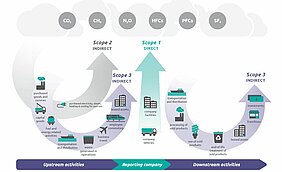In these days, climate neutrality is becoming a major topic and is also gaining importance in the drinking water supply sector. In the current project, basics, definitions and applications to drinking water supply were evaluated.
As a result of the Paris climate agreement and the Federal German Climate Protection Act, the topic of climate neutrality is becoming increasingly important. Increased public interest is also evident in the water industry. The topics of energy savings and efficiency have long been considered, but so far only a few water utilities do have a climate neutrality strategy which is, among others, due to the fact that there is currently no obligation to report on this.
A major challenge in the area of climate neutrality and greenhouse gas accounting is that so far, neither a uniform definition of climate neutrality nor a constant approach for greenhouse gas accounting exists.
That is where the project Carb (H2O)N comes into play and examines the basics of climate neutrality in drinking water supply in order to allow for the development of a clear definition and an approach or methodology for accounting.
The project includes the creation of a glossary on central terms of climate neutrality, the description of relevant ISO standards and other guidance documents as well as the derivation of a definition for climate neutrality tailored to the drinking water supply. It also identifies initial applications for drinking water treatment by descriptively comparing the various treatment technologies in terms of their expected direct and indirect greenhouse gas emissions (equivalents).
The results have been compiled in a final report which, among others, will be used as an input document for the DVGW Working Group on Climate Neutrality. The aim of the working group is to develop a guideline for drinking water supply companies that allows simple, practicable and, above all, uniform accounting of greenhouse gas emissions in water supply sector.

![[Translate to English:] Prüfstelle-Produktprüfung_Teststand Test centre and product testing](/fileadmin/_processed_/0/9/csm_TZW-Karlsruhe_Pruefung_Geraete-Teststand_377188946c.jpg)
























